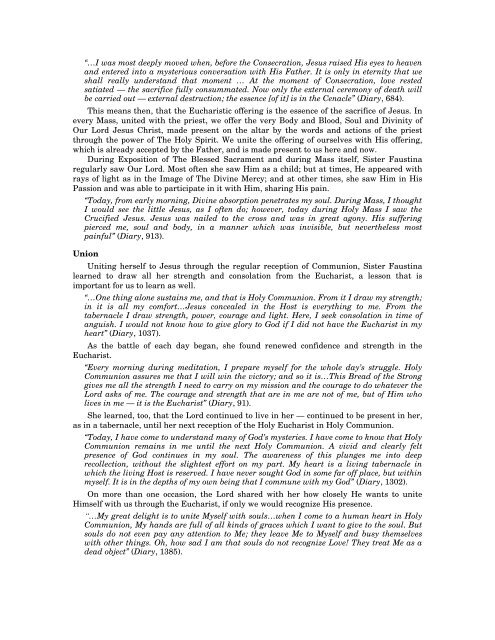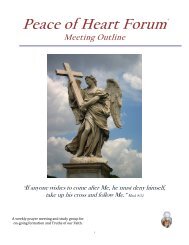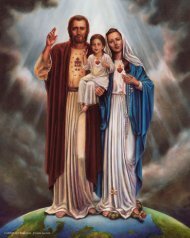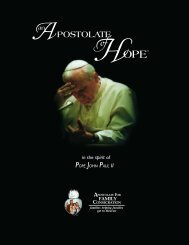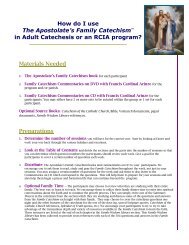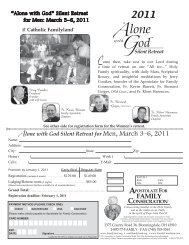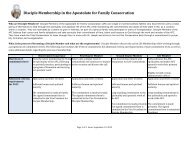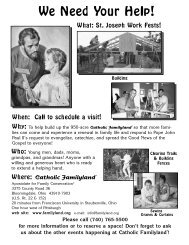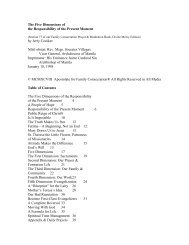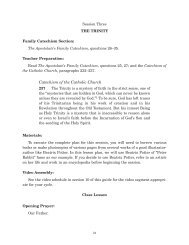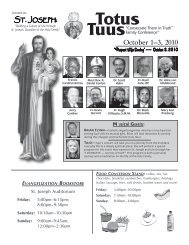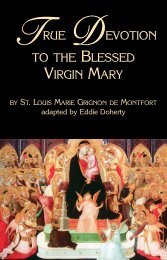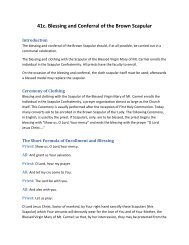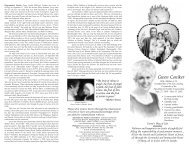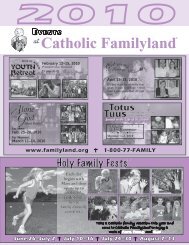20a. - 20k. Divine Mercy Section - Apostolate for Family Consecration
20a. - 20k. Divine Mercy Section - Apostolate for Family Consecration
20a. - 20k. Divine Mercy Section - Apostolate for Family Consecration
Create successful ePaper yourself
Turn your PDF publications into a flip-book with our unique Google optimized e-Paper software.
“…I was most deeply moved when, be<strong>for</strong>e the <strong>Consecration</strong>, Jesus raised His eyes to heaven<br />
and entered into a mysterious conversation with His Father. It is only in eternity that we<br />
shall really understand that moment … At the moment of <strong>Consecration</strong>, love rested<br />
satiated — the sacrifice fully consummated. Now only the external ceremony of death will<br />
be carried out — external destruction; the essence [of it] is in the Cenacle” (Diary, 684).<br />
This means then, that the Eucharistic offering is the essence of the sacrifice of Jesus. In<br />
every Mass, united with the priest, we offer the very Body and Blood, Soul and Divinity of<br />
Our Lord Jesus Christ, made present on the altar by the words and actions of the priest<br />
through the power of The Holy Spirit. We unite the offering of ourselves with His offering,<br />
which is already accepted by the Father, and is made present to us here and now.<br />
During Exposition of The Blessed Sacrament and during Mass itself, Sister Faustina<br />
regularly saw Our Lord. Most often she saw Him as a child; but at times, He appeared with<br />
rays of light as in the Image of The <strong>Divine</strong> <strong>Mercy</strong>; and at other times, she saw Him in His<br />
Passion and was able to participate in it with Him, sharing His pain.<br />
“Today, from early morning, <strong>Divine</strong> absorption penetrates my soul. During Mass, I thought<br />
I would see the little Jesus, as I often do; however, today during Holy Mass I saw the<br />
Crucified Jesus. Jesus was nailed to the cross and was in great agony. His suffering<br />
pierced me, soul and body, in a manner which was invisible, but nevertheless most<br />
painful” (Diary, 913).<br />
Union<br />
Uniting herself to Jesus through the regular reception of Communion, Sister Faustina<br />
learned to draw all her strength and consolation from the Eucharist, a lesson that is<br />
important <strong>for</strong> us to learn as well.<br />
“…One thing alone sustains me, and that is Holy Communion. From it I draw my strength;<br />
in it is all my com<strong>for</strong>t…Jesus concealed in the Host is everything to me. From the<br />
tabernacle I draw strength, power, courage and light. Here, I seek consolation in time of<br />
anguish. I would not know how to give glory to God if I did not have the Eucharist in my<br />
heart” (Diary, 1037).<br />
As the battle of each day began, she found renewed confidence and strength in the<br />
Eucharist.<br />
“Every morning during meditation, I prepare myself <strong>for</strong> the whole day’s struggle. Holy<br />
Communion assures me that I will win the victory; and so it is…This Bread of the Strong<br />
gives me all the strength I need to carry on my mission and the courage to do whatever the<br />
Lord asks of me. The courage and strength that are in me are not of me, but of Him who<br />
lives in me — it is the Eucharist” (Diary, 91).<br />
She learned, too, that the Lord continued to live in her — continued to be present in her,<br />
as in a tabernacle, until her next reception of the Holy Eucharist in Holy Communion.<br />
“Today, I have come to understand many of God’s mysteries. I have come to know that Holy<br />
Communion remains in me until the next Holy Communion. A vivid and clearly felt<br />
presence of God continues in my soul. The awareness of this plunges me into deep<br />
recollection, without the slightest ef<strong>for</strong>t on my part. My heart is a living tabernacle in<br />
which the living Host is reserved. I have never sought God in some far off place, but within<br />
myself. It is in the depths of my own being that I commune with my God” (Diary, 1302).<br />
On more than one occasion, the Lord shared with her how closely He wants to unite<br />
Himself with us through the Eucharist, if only we would recognize His presence.<br />
“…My great delight is to unite Myself with souls…when I come to a human heart in Holy<br />
Communion, My hands are full of all kinds of graces which I want to give to the soul. But<br />
souls do not even pay any attention to Me; they leave Me to Myself and busy themselves<br />
with other things. Oh, how sad I am that souls do not recognize Love! They treat Me as a<br />
dead object” (Diary, 1385).


